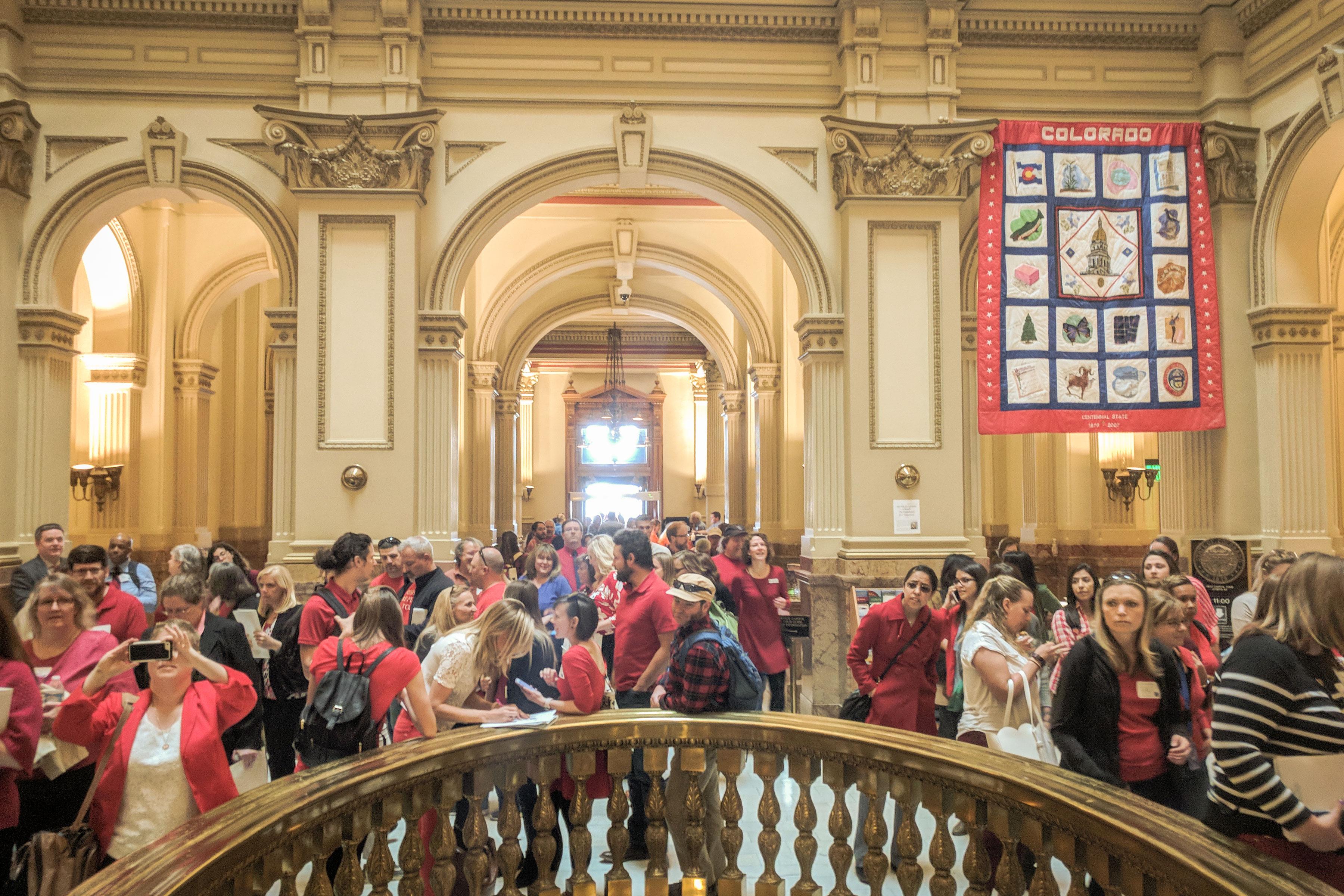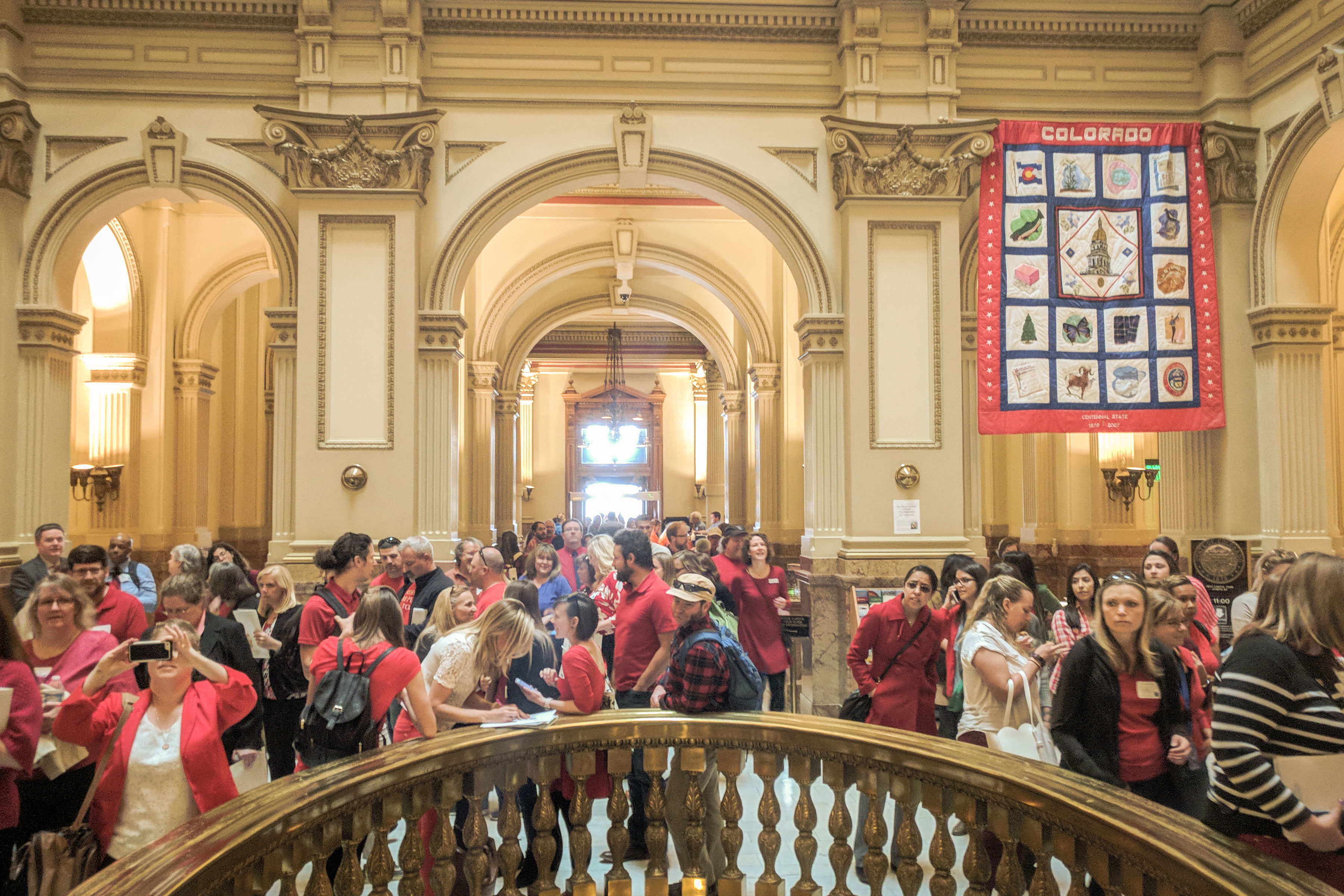

Hundreds of public school teachers swarmed the Colorado state Capitol on Monday, shuttering one suburban Denver school district to demand better salaries, as lawmakers were set to debate a pension reform measure that would cut retirement benefits and take-home pay.
With the demonstrations, Colorado educators join peers in West Virginia, Oklahoma, Kentucky and Arizona who have staged strikes or high-profile protests in recent weeks to draw attention to what teachers unions see as a growing crisis in the profession.
In Colorado the need is especially stark - and apparently at odds with a state economy that ranks among the nation's best. The average teacher salary - $46,155 in 2016 -ranks 46th among states and Washington, D.C., according to the latest figures from the National Education Association.
By another metric, Colorado's dead last. The Education Law Center, an advocacy group, said this year that Colorado's teacher salaries are the worst in the nation "when compared to professionals with similar education levels."
Teachers rallied in and outside the building Monday, holding signs and chanting slogans including "You left me no choice. I have to use my teacher voice." They drew honks from passing cars before heading inside, where their cheers and songs resonated throughout the Golden Dome, drawing lawmakers out of their respective chambers to investigate the noise.
Washington, D. C. native Callie Gonyea, who is in her second year teaching at Ellis Elementary School in Denver, said she was surprised to learn that Colorado spending was so far below the national average given the number of people moving to the state and the millions of dollars raised in taxes on legalized marijuana.
"There's no reason we should be down there," said the second-grade teacher, who walked outside the Capitol holding a sign that said "We(e')d like the weed money, man."
Gonyea said she would like to see more funding to pay for mental health treatment at her school, which has one full-time psychologist. She said her class alone has three students who would benefit from daily check-ins with the therapist, but that is not possible given other demands.
Education advocates have filed statewide ballot measures this year to raise revenue for schools, but past attempts have repeatedly been rejected by Colorado's tax-averse voters. Colorado's constitution has some of the strictest spending limits in the country, and all tax hikes require voter approval.
The event was organized by the state's largest teachers union, the Colorado Education Association, which estimated the crowd at 400. So many teachers planned to show up from one suburban school district that classes were canceled Monday. Englewood Schools Superintendent Wendy Rubin said that over 70 percent of the district's faculty was expected to be absent.
School funding has been at the forefront of the state's spending fights for years, but organizers said this year's lobbying day drew additional interest from teachers in light of recent demonstrations across the country.
Colorado currently underfunds its schools by $822 million annually, pinching rural areas in particular, where school districts face teacher shortages that many fear could get worse. Lawmakers in next year's budget plan to "buy down" the annual amount owed to schools by $150 million, and boost per-pupil spending by 6 percent. It's unclear if the additional funding will result in lasting raises in the poorest districts, where superintendents complain of losing teachers to places like Walmart due to low pay.
A sweeping pension reform effort moving through the legislature is expected to require districts and teachers alike to contribute more to the Public Employees' Retirement Association, which faces an unfunded debt to retirees of at least $32 billion. And a property-tax limiting provision of the state constitution is expected to trigger cuts to local school funding in 2019.
Colorado recently ranked 40th in spending per student according to 2013 figures from the National Center for Education Statistics compiled by the Colorado School Finance Project. That puts the state behind West Virginia (no. 20) but ahead of Oklahoma and Arizona (48 and 49).








